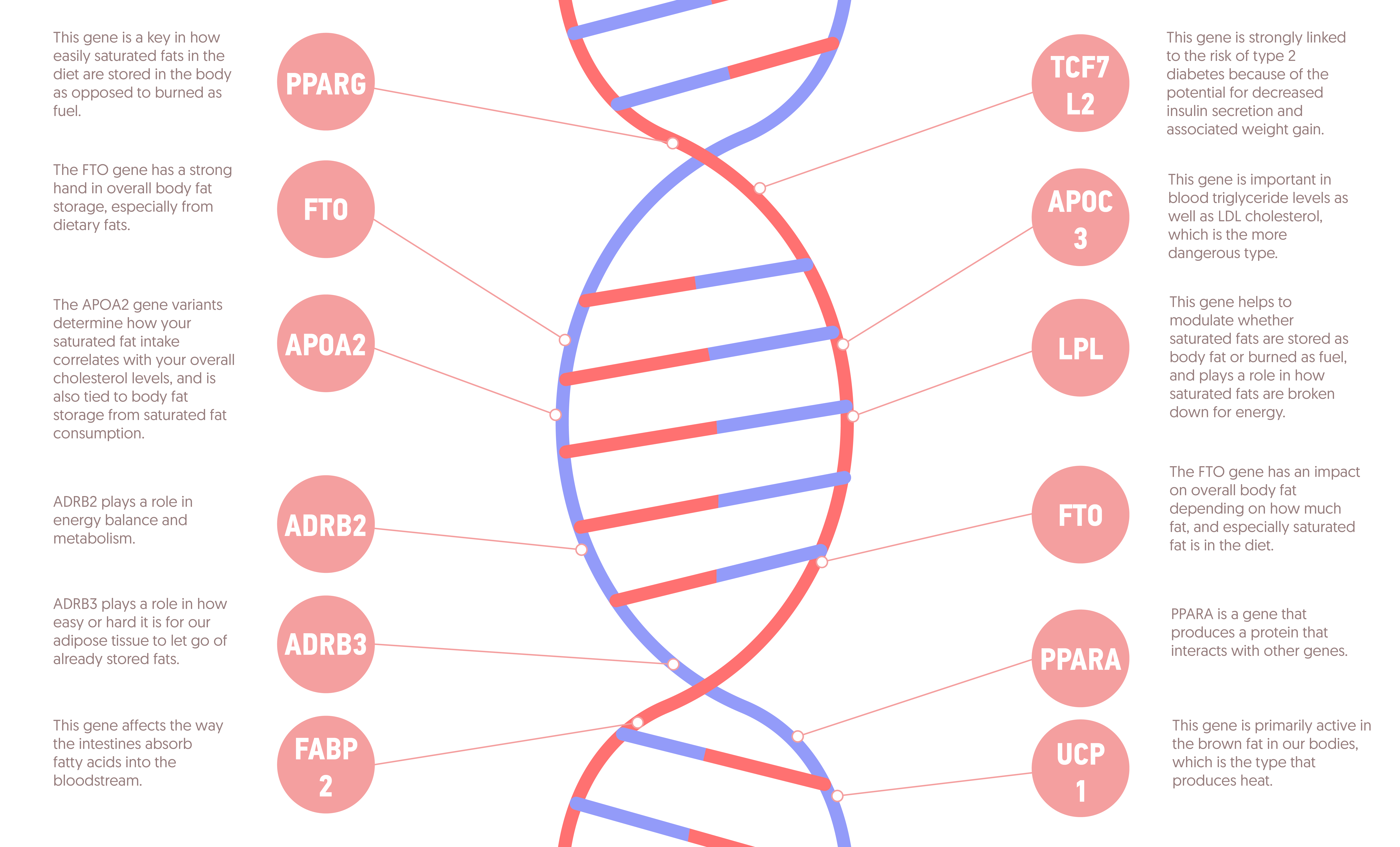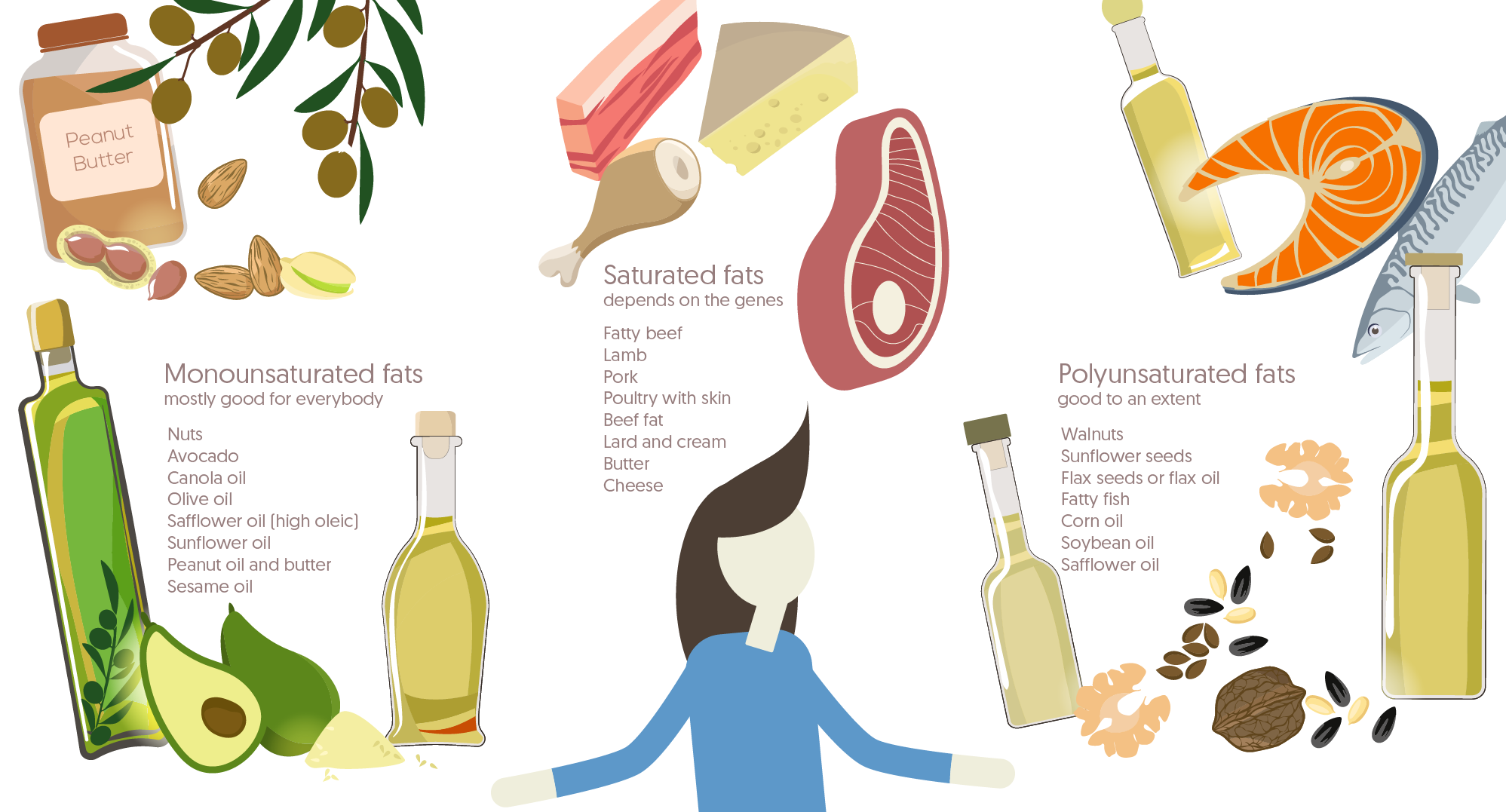Ketogenic diet has become one of the most popular diets in recent times. It’s been proven to help reach and maintain an ideal body weight [1], help to maintain and grow muscle mass [2], and could increase longevity [3]. It could help to reduce the risk for a number of diseases as well, from type 2 diabetes to heart disease to cancer [4].
Because of this, a ketogenic diet can be one of the most useful tools to help you meet your health goals.
Like all smart approaches, it isn’t a one size fits all plan. Instead, you need to consider the individual template you are working with to see how you can maximize the effectiveness of this diet for you personally.
Let's take a look how genetics can influence your body's response to different kinds of fats and ketogenic diet.
What is ketogenic diet, anyway?
A ketogenic diet is high in fat, has a moderate level of protein, and includes a very low amount of carbohydrates. It’s a popular choice because the basic guidelines are easy to follow, and many people see excellent results. It’s also one of the more encouraging diets because many people begin to see results within a week of starting this diet.
Now let's see how composition of macroniutrients makes ketogenic diet so interesting.
Macronutrient composition of diet and why does it matter
The three macronutrients are carbohydrates, proteins, and fats. Most foods are primarily made up primarily of a single macronutrient, also referred to as a macro.
Carbohydrates refer to all the starches and sugars present in commmon processed foods and convenience foods as well as some whole food sources such as rice, potatoes, bread, pasta, and pastries are primarily carbohydrates, or carbs. Fiber is also a type of carbohydrate. Carbohydrates make 5 to 10% of the overall macro percentage in keto diet. It's the net carbohydrates which is calculated by subtracting fiber from the total carbohydrates.
Fats are a focus in this diet and constitute 60 to 75% of the total macros. There are four types of fats - saturated fats like butter,coconut oil, read meat and lard; monounsaturated fats like avocados, nuts and olive oil; polyunsaturated fats like flaxseeds, salmon, soybean oil; and transfats like margarine.Transfats are considered bad and are banned in most of the products in the US and Canada.
Protein provide our body with all the essential amino acids. Protein are consumed in moderate amount on keto diet at 15 to 30% of the total calories. If protein consumption is higher than it can kick you out of ketosis.
What is ketosis, anyway?
Ketosis refers to the metabolic process in which body converts stored fats into energy releasing ketones in the process. This happens when there's not enough glucose available to meet body's energy needs and it adopts an alternate startegy by breaking down the stored fats to provide glucose from the triglycerides.
Ketones, the by product of this process, are acids that build up in the blood and are excreted through urine. People on ketogenic diet usually try to detect their levels of ketones in the blood, breath or urine.
We’ll talk more about the specifics of creating a ketogenic food plan in another post. For now, we’ll look how your genetics can affect the fat metabolism and storage for you.
How our genes affect how well a diet works for us?
Our genes are a template for how our bodies work. While some headlines may talk about certain genes that may puts us in a greater risk for disease, a more accurate way to look at genetics is as an instruction manual for your body. Once you know your genome, you have a blueprint of how your system works. It helps to solve the mystery of why some approaches work for some people and not others, and why what’s best for one person can even cause harm to another.
Though we all share the same DNA, however there are subtle differences at the sequence level which makes us unique. This genetic variation is responsible for diversity among individuals including common traits such as eye and hair color, susceptibility to diseases, response to drugs and response to different foods.
For example, certain gene variants can code for lactase production into adulthood, which means that you may be able to drink milk without problems as an adult. Similarly there are other genes code for how well we’re able to use the saturated fats in our food as energy, and knowing that can help us make a better ketogenic meal plan for improved health.
Which genes can have an impact on a ketogenic diet success?
Genes that can affect how well we metabolize, or burn, saturated fats for energy are most relevant to the formulation of a ketogenic food plan. Since most people on ketogenic diet tend to eat high amounts of saturated fats, this is important to know when getting started.
It’s also relevant because when our bodies store excess triglyceride fat and use it for energy. This means that when those stored fats are released to be burned, we can know how well our bodies will use those newly circulated fats, and if we need to target our diet and supplements to help use those fats better.

PPARG[5]
This gene regulates how easily saturated fats from diet are stored in the body as opposed to burned as fuel.**
If you have the CC variant of this gene, you are more likely to store the saturated fats that you eat, so you may have a greater risk of obesity. However, if you have the CT or TT variants, you tend to burn saturated fats more easily.
FTO [6]
The FTO gene plays a crucial role in overall body fat storage, especially from dietary fats. It is strongly linked to obesity, and type 2 diabetes.
Those with the AA variant of this gene tend to preferentially store fats that are eaten, and have a hard time using them as energy. Those with the AT and TT variants burn fats more easily, so can include fats in the diet more freely.
APOA2 [7]
The APOA2 gene variants determine how your saturated fat intake correlates with your overall cholesterol levels, and is also tied to body fat storage.
Those with the CC variant tend to have a higher BMI when saturated fats are included in the diet. The other two variants, CT and TT, do not show this association, and can tolerate higher amounts of saturated fats in their diets.
ADRB2 [8]
ADRB2 plays a role in energy balance and metabolism. It’s considered a “thrifty gene” because it can make our bodies more efficient, using as few calories as possible to function. While efficiency might sound good, in practical terms it means that its easier to eat more calories than you burn, and those extra calories are stored in our fat tissue.
The GG variant is the most efficient, so those who have this may consider keeping to a lower calorie, and especially lower saturated fat, plan. The AA and AG variants are better at burning excess calories.
ADRB3 [8]
This gene does not play a role in how well we add fat to storage. Instead, it plays a role in how easy or hard it is for our adipose tissue to let go of already stored fats.
Both the CC and CT variants of this gene tend to hold on to fat harder, and so need less of it in the diet to compensate. The TT variant has an easier time of letting go of fat stores than other variants.
FABP2 [9]
This gene affects the way the intestines absorb fatty acids into the bloodstream. About half the population has the AA variant of this gene, and it’s this variant that can absorb fatty acids more quickly than the liver can process.This can lead to elevated LDL cholesterol, and so those with this variant may want to reduce saturated fat intake.
The GG and GA variant can consume saturated fats in the diet without worry.
TCF7L2 [10]
This gene is strongly linked to the risk of type 2 diabetes because of the potential for decreased insulin secretion and associated weight gain.
For individuals carrying the TT variant of this gene, eating excess saturated fats can be dangerous, since it can elevate the risk for metabolic syndrome. Those with the CC and CT variants do not show the same risk.
APOC3 [11]
This gene is important in regulating blood triglyceride levels as well as LDL cholesterol, which is the more dangerous type. Saturated fats in the diet are the modulating factor of how strongly a role this gene plays.
Those with the CC variant of this gene have a significantly increased risk of atherosclerosis and elevated blood lipid levels when saturated fats are present in the diet. Those with the GG and GC variants do not share this increased risk.
LPL [12]
This gene helps to modulate whether saturated fats are stored as body fat or burned as fuel, and plays a role in how saturated fats are broken down for energy.
Those with the GG variant of this gene break down saturated fats and use them for energy easily. The CG and CC variants of this gene, however, have less ability to tolerate saturated fats in the diet, since they can be easily converted into cholesterol.
FTO [13]
The FTO gene impacts on overall body fat depending on how much fat, and especially saturated fat is in the diet. Fortunately, exercise has a great effect on the expression of this gene.
Those with the AA variant of this gene often see an increase in body fat when consuming more than moderate amounts of saturated fat in the diet, but those who exercised regularly saw less, and in some cases no increase in body fat. Those with the TT variant did not have an increase in body fat with saturated fats, and those with the AT variant only had a slightly elevated risk.
PPARA [14]
PPARA is involved in energy balance, especially when we run low. Activities like fasting and endurance exercise deplete our energy stores to the point that PPARA is a factor.
Those with the GG variant of this gene have an easier time unlocking the fats already stored on the body when energy is low, so fatty acids can be burned more easily. Those with the CC variant have a harder time accessing stored fats, and those with the CT variant have fat burning abilities that are between the other two.
Why is saturated fat a big deal for some people
While saturated fat can be overall protective and healthful, and is a star player in a well formulated ketogenic diet, reducing saturated fats might not be the right choice for some people. We can determine the best possible foods when we know the blueprints of our genetic data.
For the majority of people, ketosis provides a way to balance cholesterol levels, protect the heart, and achieve their ideal body weight. For others, it’s helpful to know in advance if saturated fats can cause a problem, so they can be substituted with other good fats that may work better in their situation.
Because of these gene variants, some people do less well on a standard ketogenic diet. Knowing your genome helps to solve the mystery when you aren’t making progress even when you’re following the diet perfectly.
What does this mean for you?
If you primarily have the gene variants that have no effect on your saturated fat metabolism, then you can incorporate saturated fats and foods that contain them as much as you enjoy. Since most people focus on protein sources that are muscle meats, they tend to have a significant amount of saturated fat.
If you primarily have gene variants that alter saturated fat metabolism, it would be a good idea to minimize these fats.
You’ll still need them in small amounts for essential body functions such as cell membrane integrity and hormone production, but since you may not be able to use them less well as a fuel, you’ll want to focus on foods that include less fats.
If you need to avoid the majority of saturated fats, you’ll want to get plenty of monounsaturated fats instead, and some polyunsaturated fats. Monounsaturated fats, or MUFAs, can be found in eggs, olives and olive oil, avocados, almonds, and cashews. Good sources of polyunsaturated fats, or PUFAs, include walnuts, sunflower seeds, flax seeds and oil, and fish.
Be cautious with PUFA consumption. Healthy, less processed foods contain the Omega 3 fatty acids that we need more of, whereas the more processed foods that contain soybean oil or canola oil have the Omega 6 fatty acids that can contribute to inflammation and disease if consumed in excessive amounts.
Reducing saturated fats can be a challenge for those who eat mostly muscle meats, so switching to more plant based protein sources can be beneficial. Vegetables tend to have more carbs than meats, so some good choices would be nuts, green vegetables like broccoli and spinach, cauliflower, and soy based protein like tofu and textured vegetable protein. There are many protein powders that can be made into shakes and other recipes that are from vegetable sources as well.
It is possible that few individuals may find it difdicult to lose weight or control their cholesterol levels even if they have just one or two genes that alter saturated fat metabolism. There are ways to further dial in the food choices, which may include eliminating certain foods, adding some superfoods, changing supplements, or switching workouts.
One important thing to note is it's one thing to have these gene variants but they can be expressed (turned on) or repressed (turned off). If a gene is not expressed then you may not see it's stated function.
Keep in Touch to Stay Informed
If you have already conducted genetic testing or you are interested in finding out more about nutrigenetics and nutrigenomics and how they apply to you, if you find this field interesting and/or if you simply would like to remain informed, please get your invitation at www.ginihealth.com and subscribe to the blog for regular updates.
I'm also starting this Facebook Group to have more conversation around nutrition, genetics and diet.
References:
- https://www.ncbi.nlm.nih.gov/pmc/articles/PMC2716748/
- https://www.ncbi.nlm.nih.gov/pmc/articles/PMC4271639/
- https://www.ncbi.nlm.nih.gov/pubmed/28877457
- http://onlinelibrary.wiley.com/doi/10.1111/eci.12591/full
- https://www.snpedia.com/index.php/Rs1801282
- https://www.snpedia.com/index.php/FTO
- https://www.snpedia.com/index.php/Rs5082
- https://www.ncbi.nlm.nih.gov/pmc/articles/PMC3958321/
- https://www.snpedia.com/index.php/FABP2
- https://www.snpedia.com/index.php/TCF7L2
- https://www.ncbi.nlm.nih.gov/pmc/articles/PMC3491165/
- https://nutritionandmetabolism.biomedcentral.com/articles/10.1186/s12986-016-0155-1
- https://www.ucl.ac.uk/news/news-articles/0713/15072013-How-obesity-gene-triggers-weight-gain-Batterham
- http://advances.nutrition.org/content/4/4/439.full
- https://www.ncbi.nlm.nih.gov/pmc/articles/PMC3691397/



